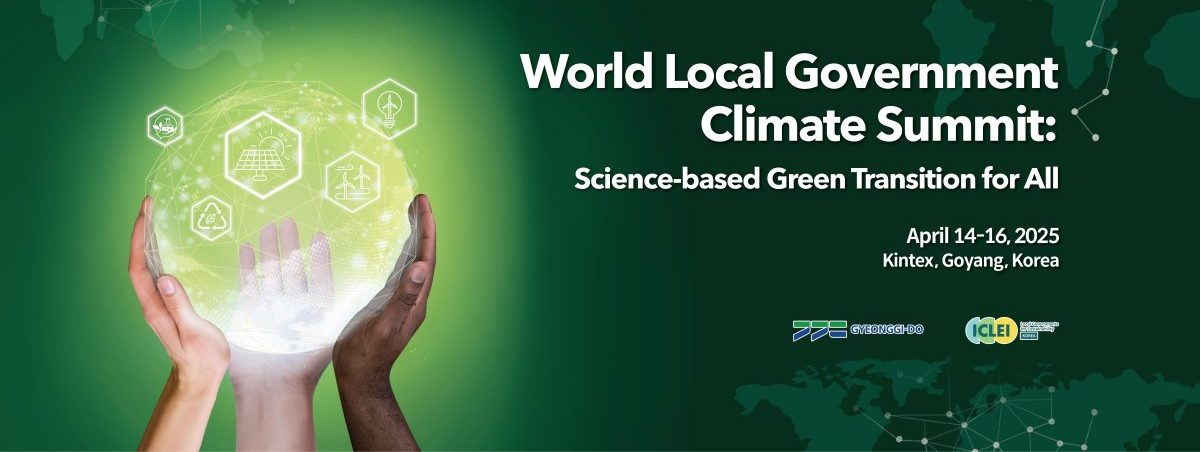World Local Government Climate Summit: Technology empowers local action to build a greener future

According to the Paris Agreement, countries must update their greenhouse gas reduction targets by 2025. With over 57% of the global population residing in urban areas, local governments have a crucial part to play in achieving global climate targets, and their involvement is essential in driving progress toward these global goals.
The World Local Government Climate Summit took place successfully in Goyang, South Korea, from April 14 to 16, 2025. The event drew 1,602 registered delegates from 44 countries, with 1,577 attending in person. Among the participants were 30 mayors and 11 deputy mayors representing 82 local governments across 29 nations, highlighting the significant role and active involvement of local authorities in addressing climate challenges.

Group photo at the closing ceremony of the World Local Government Climate Summit (Photo: ICLEI East Asia)
Co-hosted by ICLEI and the Gyeonggi Provincial Government of South Korea, the Summit’s main theme is “Local transition to address the climate crisis and enhance quality of life”, focused on five sub-themes: science-based solutions, citizen participation, climate economy, inclusiveness, and harmony with nature. By sharing best practices and innovative technological solutions, participants delved into the science-driven path for green transformation, aimed at empowering local governments to better tackle the climate crisis.
East Asia’s Active Participation: Showcasing New Practices in Urban Governance
Representatives from various cities across East and Central Asia, including Guiyang, Changchun, and Chengdu in China, Ulaanbaatar, Darkhan, and Erdenet in Mongolia, and Kattakurgan and Gijduvan-District in Uzbekistan, attended the Summit, showcasing their cities’ innovative climate action practices and highlighting their achievements at different high-level thematic sessions.
On April 15, ICLEI East Asia held the East Asia Regional Executive Committee (RexCom) Annual Meeting. City leaders and representatives from Seoul, Changchun, Gyeonggi Province and New Taipei City attended the meeting as RexCom members and delivered presentations, while Kyoto City representatives virtually participated in the meeting. The annual meeting reviewed the efforts of local governments in East Asia in the field of sustainable development for the period 2024–2025 and discussed their strategic role in global climate action.

Group photo of the ICLEI East Asia Executive Committee Annual Meeting (Photo: ICLEI East Asia)
Highlights of urban practices from East and Central Asia
During the panel discussion titled “AI and Data-Driven Solutions: MRV Systems,” Zhuyun XIAO, a Senior Planner and Senior Engineer at the Chengdu Institute of Planning and Design, shared insights into Chengdu’s evolution toward a more innovative and technology-driven environment. The city has long embraced the integration of nature into urban planning, a practice that dates back to ancient times. A prime example is the Dujiangyan (都江堰) Water Conservancy Project, which has been in operation for over 2,000 years and continues to play a crucial role in irrigation and flood control for the region. This enduring philosophy of harmony with nature underpins Chengdu’s “Park City” initiative, guiding the city toward sustainable urban development that coexists seamlessly with its natural surroundings.
Chengdu is taking proactive steps to harness artificial intelligence and big data for enhancing its environmental governance and disaster response strategies. For instance, the city has developed a wind environment model using over a decade of meteorological data, aimed at optimizing urban design and improving the visibility of its snow-capped mountains. Additionally, hydraulic models are employed to simulate extreme rainfall scenarios, thereby boosting the city’s flood resilience through the incorporation of wetlands and other ecosystems. Moreover, by utilizing natural language processing and image recognition technologies to analyze social data, Chengdu is better equipped to inform urban greening initiatives, ensuring they align with the needs and preferences of its residents.

Zhuyun XIAO, Senior Planner and Senior Engineer of Chengdu Planning and Design Institute, delivered a speech at the symposium on “AI and Data-Driven Solutions, MRV System”. (Photo: ICLEI East Asia)
Fei He, the Vice Mayor of Guiyang City, delivered an insightful speech at the high-level thematic session “Climate Action in Harmony with Nature”. In his address, he outlined Guiyang’s strategic initiatives aimed at fostering green, low-carbon, and high-quality development. The city is committed to integrating climate action into its urban planning and is actively exploring sustainable pathways through the establishment of a green, low-carbon, and circular economic system. Notably, Guiyang has taken the initiative to establish a judicial body specifically dedicated to addressing ecological conservation cases, along with the country’s first green finance court, which bolsters institutional safeguards for environmental protection.

He Fei, Vice Mayor of Guiyang, speaks at a session titled “Climate Action in Harmony with Nature” (Photo: ICLEI Korea)
In recent years, Guiyang has been making significant strides in its green and low-carbon transformation. The city has increased its clean energy share and optimized its industrial structure. Currently, Guiyang boasts an impressive installed capacity of 1.648 million kilowatts from hydropower plants, 200,000 kilowatts from centralized photovoltaic power stations, and 207,500 kilowatts from wind farms. Since 2020, the city has rolled out 886 technological transformation projects, with total investments surpassing 40 billion yuan. Today, Guiyang is home to 87 green factories, 23 enterprises engaged in green supply chain management, and 11 green industrial parks. Additionally, the city has pioneered innovative approaches to respond to climate-related disasters, enhancing its capabilities to prevent and manage extreme weather events. This includes employing scientific and technological methods, such as risk prediction and assessment models, to mitigate the impact of such events on urban operations and the lives of its residents.

Thematic session on “Climate Action in Harmony with Nature”. (Photo: ICLEI East Asia)
Jasur Sharipov, the Deputy Head of Innovation and Development for the Gijduvan District in Uzbekistan, participated in a roundtable discussion regarding”Climate Justice & Social Safety Nets for Vulnerable Groups.” He highlighted that Uzbekistan is actively addressing the challenges presented by climate change by enhancing the efficiency of natural resource utilization, bolstering environmental protection, and improving social security systems. In recent years, the country has introduced several reforms aimed at enhancing social security, providing both economic and social support for vulnerable communities, and rolling out targeted assistance programs for those most impacted by climate change. Gijduvan District, part of the Bukhara region’s 11 districts, places particular emphasis on clean energy, prioritizing the development of renewable energy sources such as wind and solar power.

Jasur Sharipov, Deputy Minister of Innovation and Development of the Gijduvan District of Uzbekistan, participated in a roundtable discussion on the topic “Climate Justice & Social Safety Nets for Vulnerable Groups”. (Photo: ICLEI East Asia)
Amartuvshin Amgalanbayar, the Deputy Governor of Ulaanbaatar, Mongolia, addressed at a high-level session focused on “Local Revitalization through Climate Technologies.” During his speech, he highlighted the city’s initiatives to promote renewable energy as a key strategy in combating climate change. Although Ulaanbaatar occupies only 0.3% of the nation’s land area, it is home to over 50% of the population and contributes to 67% of the country’s GDP. As a result, the city grapples with a host of challenges, including air pollution, housing shortages, and traffic congestion.
To tackle these challenges, Ulaanbaatar is proactively working on Mongolia’s Vision 2050 and is expediting the development of renewable energy, with a goal of increasing its contribution to 30% by the year 2050. The city is committed to enhancing the living conditions of yurt residents through the adoption of new energy solutions, optimizing urban heating systems, and constructing smart cities. This initiative aims to promote green transformation and foster sustainable urban development.

Amartuvshin Amgalanbayar, Deputy Mayor of Ulaanbaatar, Mongolia, speaking at the conference “Local Revitalization through Climate Technology”.(Photo: ICLEI East Asia)
Summit Highlights and Consensus
The Summit featured 3 plenary sessions, 11 thematic sessions, 2 special sessions, and 2 side events, with a total of 107 speakers on stage to share their views, covering policy making, technological innovation, social participation, and other fields.
After three days of in-depth discussions and exchanges, the participants came to a broad agreement. Local governments recognize the seriousness of the climate crisis, and have shown a strong willingness to take actions. They concurred on the need for science-based climate policies to speed up the development of renewable energy and decarbonization industries. Additionally, it’s important to establish an inclusive and transparent framework for cooperation to enhance the fairness and coordination of policy execution. The Summit highlighted the necessity of bolstering protections for vulnerable groups, particularly low-income individuals and the elderly, ensuring they are safeguarded from the repercussions of the climate crisis. Furthermore, by adopting ecosystem-oriented climate policies, we can strengthen community resilience and facilitate a transition to a society that thrives in harmony with nature.
As Ulaanbaatar Deputy Governor Amartuvshin Amgalanbayar highlighted at the closing ceremony, “We firmly believe that through our united efforts, we can guide our city toward prosperity and significantly contribute to creating a green and sustainable future for all.”





